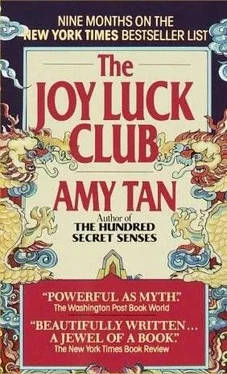My mother was not happy with the apartment, but I didn't see that at first. When we moved in, she busied herself with getting settled, arranging the furniture, unpacking dishes, hanging pictures on the wall. It took her about one week. And soon after that, when she and I were walking to the bus stop, she met a man who threw her off balance.
He was a red-faced Chinese man, wobbling down the sidewalk as if he were lost. His runny eyes saw us and he quickly stood up straight and threw out his arms, shouting, "I found you! Suzie Wong, girl of my dreams! Hah!" And with his arms and mouth wide open, he started rushing toward us. My mother dropped my hand and covered her body with her arms as if she were naked, unable to do anything else. In that moment as she let go, I started to scream, seeing this dangerous man lunging closer. I was still screaming after two laughing men grabbed this man and, shaking him, said, "Joe, stop it, for Chrissake. You're scaring that poor little girl and her maid."
The rest of the day-while riding on the bus, walking in and out of stores, shopping for our dinner-my mother trembled. She clutched my hand so tightly it hurt. And once when she let go of my hand to take her wallet out of her purse at the cash register, I started to slip away to look at the candy. She grabbed my hand back so fast I knew at that instant how sorry she was that she had not protected me better.
As soon as we got home from grocery shopping, she began to put the cans and vegetables away. And then, as if something were not quite right, she removed the cans from one shelf and switched them with the cans on another. Next she walked briskly into the living room and moved a large round mirror from the wall facing the front door to a wall by the sofa.
"What are you doing?" I asked.
She whispered something in Chinese about "things not being balanced," and I thought she meant how things looked, not how things felt. And then she started to move the larger pieces: the sofa, chairs, end tables, a Chinese scroll of goldfish.
"What's going on here?" asked my father when he came home from work.
"She's making it look better," I said.
And the next day, when I came home from school, I saw she had again rearranged everything. Everything was in a different place. I could see that some terrible danger lay ahead.
"Why are you doing this?" I asked her, afraid she would give me a true answer.
But she whispered some Chinese nonsense instead: "When something goes against your nature, you are not in balance. This house was built too steep, and a bad wind from the top blows all your strength back down the hill. So you can never get ahead. You are always rolling backward."
And then she started pointing to the walls and doors of the apartment. "See how narrow this doorway is, like a neck that has been strangled. And the kitchen faces this toilet room, so all your worth is flushed away."
"But what does it mean? What's going to happen if it's not balanced?" I asked my mother.
My father explained it to me later. "Your mother is just practicing her nesting instincts," he said. "All mothers get it. You'll see when you're older."
I wondered why my father never worried. Was he blind? Why did my mother and I see something more?
And then a few days later, I found out that my father had been right all along. I came home from school, walked into my bedroom, and saw it. My mother had rearranged my room. My bed was no longer by the window but against a wall. And where my bed once was-now there stood a used crib. So the secret danger was a ballooning stomach, the source of my mother's imbalance. My mother was going to have a baby.
"See," said my father as we both looked at the crib. "Nesting instincts. Here's the nest. And here's where the baby goes." He was so pleased with this imaginary baby in the crib. He didn't see what I later saw. My mother began to bump into things, into table edges as if she forgot her stomach contained a baby, as if she were headed for trouble instead. She did not speak of the joys of having a new baby; she talked about a heaviness around her, about things being out of balance, not in harmony with one another. So I worried about that baby, that it was stuck somewhere between my mother's stomach and this crib in my room.
With my bed against the wall, the nighttime life of my imagination changed. Instead of street sounds, I began to hear voices coming from the wall, from the apartment next door. The front-door buzzer said a family called the Sorcis lived there.
That first night I heard the muffled sound of someone shouting. A woman? A girl? I flattened my ear against the wall and heard a woman's angry voice, then another, the higher voice of a girl shouting back. And now, the voices turned toward me, like fire sirens turning onto our street, and I could hear the accusations fading in and out: Who am I to say!…Why do you keep buggin' me?…Then get out and stay out!…rather die rather be dead!…Why doncha then!
Then I heard scraping sounds, slamming, pushing and shouts and then whack! whack! whack! Someone was killing. Someone was being killed. Screams and shouts, a mother had a sword high above a girl's head and was starting to slice her life away, first a braid, then her scalp, an eyebrow, a toe, a thumb, the point of her cheek, the slant of her nose, until there was nothing left, no sounds.
I lay back against my pillow, my heart pounding at what I had just witnessed with my ears and my imagination. A girl had just been killed. I hadn't been able to stop myself from listening. I wasn't able to stop what happened. The horror of it all.
But the next night, the girl came back to life with more screams, more beating, her life once more in peril. And so it continued, night after night, a voice pressing against my wall telling me that this was the worst possible thing that could happen: the terror of not knowing when it would ever stop.
Sometimes I heard this loud family across the hallway that separated our two apartment doors. Their apartment was by the stairs going up to the third floor. Ours was by the stairs going down to the lobby.
"You break your legs sliding down that banister, I'm gonna break your neck," a woman shouted. Her warnings were followed by the sounds of feet stomping on the stairs. "And don't forget to pick up Pop's suits!"
I knew their terrible life so intimately that I was startled by the immediacy of seeing her in person for the first time. I was pulling the front door shut while balancing an armload of books. And when I turned around, I saw her coming toward me just a few feet away and I shrieked and dropped everything. She snickered and I knew who she was, this tall girl whom I guessed to be about twelve, two years older than I was. Then she bolted down the stairs and I quickly gathered up my books and followed her, careful to walk on the other side of the street.
She didn't seem like a girl who had been killed a hundred times. I saw no traces of blood-stained clothes; she wore a crisp white blouse, a blue cardigan sweater, and a blue-green pleated skirt. In fact, as I watched her, she seemed quite happy, her two brown braids bouncing jauntily in rhythm to her walk. And then, as if she knew that I was thinking about her, she turned her head. She gave me a scowl and quickly ducked down a side street and walked out of my sight.
Every time I saw her after that, I would pretend to look down, busy rearranging my books or the buttons on my sweater, guilty that I knew everything about her.
My parents' friends Auntie Su and Uncle Canning picked me up at school one day and took me to the hospital to see my mother. I knew this was serious because everything they said was unnecessary but spoken with solemn importance.
"It is now four o'clock," said Uncle Canning, looking at his watch.
Читать дальше












